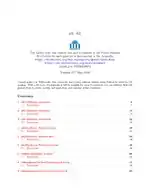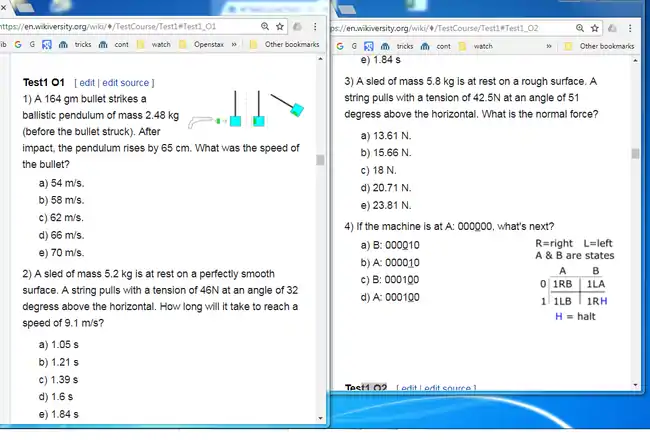- Quizbank now resides on MyOpenMath at https://www.myopenmath.com (although I hope Wikiversity can play an important role in helping students and teachers use these questions!)
- At the moment, most of the physics questions have already been transferred. To see them, join myopenmath.com as a student, and "enroll" in one or both of the following courses:
- Quizbank physics 1 (id 60675)
- Quizbank physics 2 (id 61712)
- Quizbank astronomy (id 63705)
The enrollment key for each course is 123. They are all is set to practice mode, giving students unlimited attempts at each question. Instructors can also print out copies of the quiz for classroom use. If you have any problems leave a message at user talk:Guy vandegrift.
- Latest essay: MyOpenMath/Pulling loose threads


- Classroom-ready quizzes and exams for Unit 2 of OpenStax University Physics V2 are now available
- Quizzes are organized into "units" (with study guides). Completed units are listed at Category:Quizbank/Units
- All quizzes are listed at QB
- All questions are listed at Quizbank/All questions
- Most of the software that operates Quizbank can be found at Quizbank/Python
- Special:PrefixIndex/Quizbank/Under construction is where quizzes belong before they are ready for QB
- A debt crisis in higher education
Conceptual
- Markup at QB/e HuntEdgeSpace
- LaTeX-rendered Pdf at File:Quizbankqb_e_HuntEdgeSpace.pdf
Numerical (many renditions)
- Markup at QB/a02 1Dkinem definitions
- LaTeX-rendered Pdf at File:Quizbankqb_a02 1Dkinem definitions.pdf
About
Quizbank[1] is a collection of conceptual and numerical quizzes that serve a dual purpose: (1) They can be used online by students for practice; and (2) a Python code can turn them into in-class multiple choice quizzes and exams. Quizbank is used for all the exams that User:Guy vandegrift teaches at Wright State University Lake Campus. A study guide posted on Wikiversity shows students how many questions from each exam will be randomly selected from each quiz.[2] For a sample study guide, see Wright State University Lake Campus/2016-9/Phy1050/Study guide
The cat and mouse game
But it's bad policy to let everybody see the testbank!


Three answers to that comment:
- With a bit of effort private wikis could permit "secret" quesions known only to the instructor.
- The cat is out of the bag. Students can already download testbanks for a fee of typically $50.[4][5]
- One application where it might be good policy involves the concept of a flipped classroom. This collection of 4-question quizzes could allow instructors to verify whether students have at least looked at all the examples of a chapter. Only by either understanding or memorizing the steps required to solve these problems could they do well on the quizzes. In principle, it should be possible to someday revise the contact hours associated with teaching introductory courses in a classroom setting that is both economical and convenient for students. Why should they hear the professor say what could so easily be read or seen on video? Key to this concept is the fact that there is no reason for the publishers of OER to perpetually modify their products to ensure future sales.[6] Hence, a quiz question based on an example in an OER textbook is likely to have a long "shelf life" because the publishers and authors of these not-for-profit texts have a long list of books waiting to be written and no time needlessly tinker with books already published.[7]
But test-based education is over rated!
Yes it is. But keep in mind the following:
- Students contributing to the testbank rates high on Bloom's taxonomy (see this student effort at File:Anonymous_Life_in_the_Universe.pdf.)
- We need to reduce the cost of higher education. Student loan debt is shown in red in the figure. The only larger form of debt is mortgage debt, which is also a form of investment. I teach mostly introductory courses and spend a lot of time telling students things that most of them already know and all of them should have known before the class began. Why not cut the lecture time in half, and establish preliminary exams for students to pass? Those who are bad test takers can instead contribute exams and/or essays. Or, they can get tutored by other students to pass the exams. With a little good judgement, the instructor can control the negative influence of these exams.[8]
- The highest form of teaching is to teach students to teach themselves. Why can't we provide exams for some of our courses so that students wishing pursue autodidacticism could attempt to "test out" of all or part of the course?
- An easy way to "hide the good questions in plain sight" would be to require that students create test questions and grade them for originality and usefulness. Someday, the experts could data-mine these banks for the useful questions.
Footnotes
- Quizbank/Archive1 Shows this page before 2 June 2018: special:permalink/1880369. This archive created a lot of
that need to be cleaned up.
- ↑ For the latest update visit Quizbank/News
- ↑ Each exam also includes an instructor's version with all questions in chronological order in order to facilitate preparation for the exams.
- ↑ Or, if it is for profit, we can at least make it legal and inexpansive, like for example Quizlet
- ↑ http://testbankscafe.eu/index.php?route=product/search&search=Physics
- ↑ http://testbankscafe.eu/Test-Bank-for-Physics-Concepts-and-Connections-5th-Edition-Art-Hobson?search=Physics
- ↑ When I was a student back in the 1970s, textbooks rarely came out in more than 2 editions, making it easy to buy used books. Now as many as 10 editions of a textbook is routine. Once a publisher accidentally sent out a mixture of the latest edition plus the previous edition. The bookstore arranged for students to return the out-of-date edition for a free replacement. I was astonished to hear the bookstore clerk tell me that the old books would probably be destroyed (presumably because the publisher does not want large numbers of outdated editions on the market.)
- ↑ In contrast, there are reasons why the for-profit publishers want to "improve" their textbooks in order to find an excuse to replace them
- ↑ One good policy might be to allow students to deduct a certain number of incorrect answers. That would, for example, cause a 85% to be recorded exactly if it were a 100% score. This would give students some flexibility regarding questions they "don't like".
